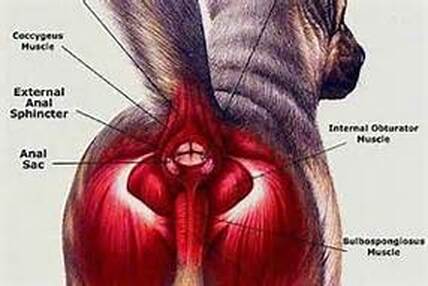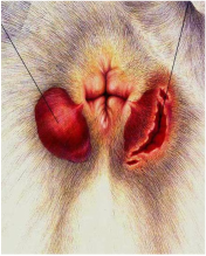Everything You Need to Know About Anal Glands....
|
The anal glands (sometimes called anal sacs) are located on either side of the anus just underneath the skin in dogs and cats. The glands are located at 8 o'clock and 4 o'clock if you are looking at the pet from behind. Anal glands produce and store a dark, foul-smelling fluid. These are the same type of organs that a skunk has to scare away its enemies. If not routinely emptied, the fluid builds up, solidifies, and becomes an ideal environment in which bacteria can grow.
|
There are three disease that can occur in the anal glands.
- Impaction- when the fluid becomes thick, solidified, and difficult to express.
- Infection- when bacteria grows in the fluid, producing yellow or bloody pus.
- Abscess- when the infection builds to create a hot, tender swelling in the gland. The abscessed material can overflows the gland causing an obstruction of the duct. When the duct is obstructed, the abscess continues to build, and the skin over the gland can rupture open, becoming a large bloody wound.
|
Symptoms of anal sac disease include:
|
If anal gland disease is suspected, your veterinarian will perform a rectal exam to express the diseased gland. Depending on the problem, the gland may need to be flushed or infused with antibiotic ointment. Some pets require oral antibiotics or anti-inflammatories. Other disorders that can have similar symptoms include: intestinal parasites, skin disease, or anal gland tumors.
Some pets will have recurrent anal gland disease, especially if they are overweight. The anal glands of obese pets do not drain well, thus these pets are predisposed to recurrent problems.
Many groomers include anal gland expression as part of their grooming package. Be aware that groomers typically express the glands by applying pressure externally (as opposed to internally the way a veterinarian would), so the glands may not adequately empty if they are diseased. Groomers, however, can give you a "heads up" if something about the anal glands don't seem right. Anal glands should be checked any time that symptoms are noted.
Some pets will have recurrent anal gland disease, especially if they are overweight. The anal glands of obese pets do not drain well, thus these pets are predisposed to recurrent problems.
Many groomers include anal gland expression as part of their grooming package. Be aware that groomers typically express the glands by applying pressure externally (as opposed to internally the way a veterinarian would), so the glands may not adequately empty if they are diseased. Groomers, however, can give you a "heads up" if something about the anal glands don't seem right. Anal glands should be checked any time that symptoms are noted.


